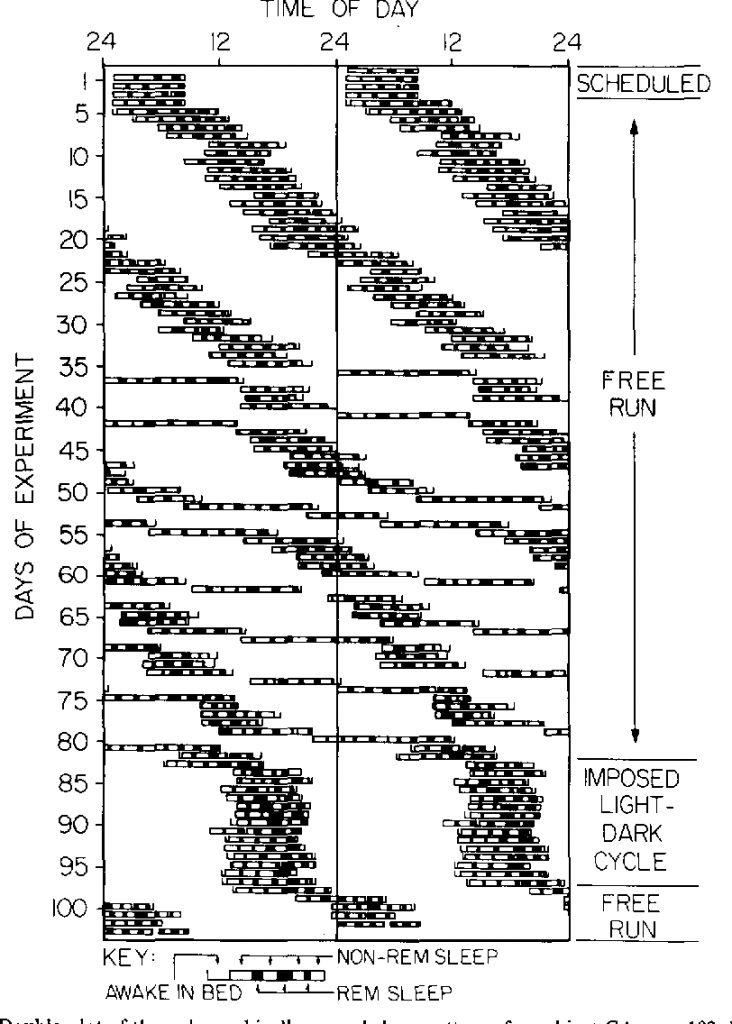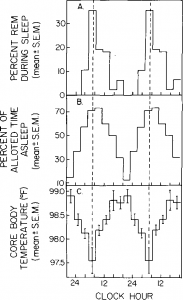Altered circadian rhythm
Altered Circadian Rhythm
The purpose of this section is to show the health effects of polyphasic sleep on an altered circadian rhythm and if this actually happens.
Background
In a nutshell, the circadian rhythm is our body clock, and external cues shift it. At certain points during the day, the body releases specific hormones. The body temperature changes and the ideal sleep peaks become possible to determine. All this is based on the biological clock. If you start messing with it, you could possibly develop some negative side effects.
Here, we assess the circadian health from two different perspectives:
- First, what happens if you don’t maintain good circadian health.
- Second, what happens if your sleep schedule actually alters the architecture of your circadian rhythm.
Not ensuring good health
There are certain ways that disrupt your circadian rhythm. Examples include:
- Exposing yourself to bright light during the night
- Night eating
- Exercising at irregular hours
You can constantly shift the timings in the circadian rhythm with these factors. Therefore, they could lead to the development of cardiovascular diseases, obesity, diabetes, etc.
Because of this, the polyphasic community has some recommendations in place to secure the circadian rhythm. More information on that is available here.
Sleep schedules altering the circadian rhythm
What happens if your sleep pattern alters the structure of your circadian rhythm?
Up to date, there is some evidence from how the light timing alters your circadian rhythm’s architecture. For example, in this paper, “In short photoperiods, human sleep is biphasic“ by Thomas Wehr, the author found evidence for an altered internal structure of the circadian rhythm from shortening the length of the photoperiod.
Internal and External processes
This is fair; however, if internal processes, like the sleep pattern of people, alter the circadian rhythm, this can lead to some nasty consequences. External processes that alter the timing of the circadian rhythm are zeitgebers. So far, there are seven of them:
- Light
- Temperature
- Exercising
- social interactions
- Eating
- Atmospheric conditions
- Some medications
Therefore, if “sleep” is on this list and you are on a Segmented schedule, your body could start thinking that it is a new circadian day every time after you wake up from the first core. As a result, this would carry the same risks as prematurely exposing yourself to light during the night.
Circadian rhythm on polyphasic sleep schedules
At this point in time, it is unknown if polyphasic sleep alters the structure of the circadian rhythm. However, there doesn’t seem to be any evidence for it.
- It seems more like sleep is a manifestation of the circadian rhythm rather than a contributor to setting the circadian timings.
- One good example to represent this idea is from the study, “Timing of REM sleep is coupled to the circadian rhythm of body temperature in man.” It has good visuals on a desynchronized sleep pattern; in addition, we can clearly see that the optimal REM timing does not shift even though the subjects have different sleep times each day.


In fact, desynchronization studies would most likely be impossible to complete if sleep could alter the circadian architecture. This is just something to consider here.
Debunking
If you are looking for evidence to debunk polyphasic sleep, this could be another topic. What you would need to find evidence for is:
- Altering your sleep structure would affect the circadian timings.
- The altered circadian timings resulted in negative health effects.
As of late, this is the point with the least weight against polyphasic sleep. This is if it turned out to be the case, especially if the circadian morning was set at a strict time with several other zeitgebers. One way sleep appears to be able to affect the circadian rhythm today is by inhibiting other zeitgebers at the time you are sleeping.
Basically if you are asleep, you can not eat or exercise. However, it is still affecting us on a secondary level rather than a primary level.
